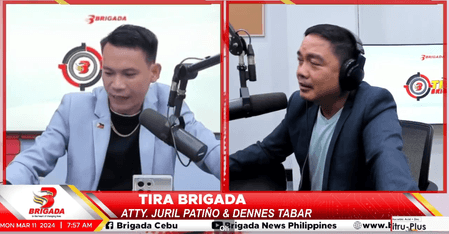SUMMARY
This is AI generated summarization, which may have errors. For context, always refer to the full article.
![[Free to disagree] Patiño and Tabar: Dim, deviant or despicable?](https://www.rappler.com/tachyon/2024/03/TL-dim-deviant-or-despicable-mar-26-2024.jpg)
For most of my professional life I have been giving free counseling services to victims of sexual violence. My patients have been mostly women, but children have also been referred to me.
My counseling work in this area began in 1988 when I became the Secretary of the Board of the first-ever rape and crisis center for women in the Philippines, the Women’s Crisis Center. I recall how, when our volunteers accompanied victims to the police stations, everybody and their uncle would enter the interviewing room once it was known that the complaint was rape.
For the decades I have been a counselor, I have had to discipline media (local and sometimes foreign) who, for some reason, think that I would do the following:
- reveal someone in my patient list to them by asking any patient of mine if they were willing to be interviewed or;
- agree to see the victim and hold my therapeutic session as the cameras rolled. Apparently, these people think that should the victim consent, this would satisfy ethical requirements.
Uh, no. Perhaps it satisfies their cheap conceptions of ethics but such “consent” does not satisfy my ethical standards. I really would have to be some kind of narcissist to agree to the kind of shameless self-promotion of having my first patient session filmed before I could even assess what the problem is. As well, I cannot for the life of me consider how I might ask any patient of mine whether she would like to talk to the media. Knowing the power dynamics between doctor and patient, there is no way I can ensure that this suggestion will not be taken as a recommendation towards healing, thus countermanding informed consent.
Rarely helpful
In my experience, media exposure is rarely helpful and quite often detrimental.
I have occasionally agreed with a patient to have their story documented by the media. I have done so reluctantly, often after a thorough discussion, and only after I am assured this is the patient’s will. In fact, I left a well-known women’s organization long ago, partly because their formula for handling cases seems to go too often to the path of protests and victims “breaking the silence”.
In my experience, seeking justice, even filing criminal cases, need not be accompanied by a media circus. Indeed, when it is accompanied by such a circus, the victim takes a much longer time to heal or the healing is never as complete.
I have a somewhat paranoid suspicion that the foreign (mostly Western) journalists are guilty of racism, thinking that they can cajole some psychologist into agreeing to their suggested shenanigans. Perhaps their contacts here in the Philippines put them up to it.
Like Dennes Tabar and Juril Patiño maybe?
Dim
Brigada News FM Cebu broadcasters Patiño and Tabor have gained notoriety recently because of what can only be described as a “dumb as a sack of rocks” of interviewing a 4- year-old girl about her rape on their radio program. Reports state that Brigada News reporter Jonalyn Jumabis facilitated the interview from within the police station where the child was in protective custody.
I almost did not write this opinion piece out of a sense of nationalism, that something like this could lead outsiders to think that we are a poorly educated, low-rent, third-world country. But given the quickness by which professional associations of journalists like the Kapisanan ng Mga Brodkasters ng Pilipinas in Cebu, The Stet, Cebu Women in Media and the National Union of Journalists in the Philippines condemned the actions of Patiño and Tabar, it is obvious to me the the two were in some no-think zone. I suppose they thought they had a scoop. What they had was a large scoop of ordure.
Obviously we need to ask where these two got their sexuality education, whether they went to journalism school, or whether they really got any real education at all.
As it turns out, Patiño is a lawyer and Tabar is a former barangay captain.
It seems they fell through the cracks of their schools’ educational standards. Education is about transmitting technical and scientific knowledge but also about transmitting values such as current ethical standards of the discipline or profession.
In the early days of this travesty, both broadcasters were reported to be unremorseful. One of their justifications was that they only did the interview in all its graphic detail in order to help strengthen the case. Patiño seems to have ignored the law on protecting children victims of abuse against interviews like the type he undertook. He also seems to be proposing a legal theory that sensationalist media exposure strengthens the merits of a case. Even if I am a lay person, I did not bother to run that by friends who are in the legal profession. I did not want to get unfriended.
Deviant
As I am an educator, I will give whatever schools produced Patiño and Tabar the benefit of the doubt. So I will assume they taught Patiño the basics, like lawyers should know the law. I will assume that Tabar was taught things like broadcasters have to abide by the law and to look up the ethical standards of journalism. If we grant they know the law and standards, this would mean Patiño and Tabar understand that you do not re-traumatize a four year old by interviewing for the purposes of generating content.
Why did Patiño and Tabar do it? If it wasn’t for viewership as these two “broadcasters” insist, and it is illogical to believe their claim that they wanted strengthen the case, was it because they thought somehow it was worthwhile or even enjoyable?
The egregiousness of the interview is such that “dumb” may be the kindest interpretation we can have of these two.
Because for those who heard the interview, it sounded like the interviewers were happy about the graphic descriptions they evoked from the child. Not having examined the two professionally, I cannot tell whether their erotic proclivities tend toward the criminal. But the fact that they thought this line of questioning would be acceptable, tells us about a culture that socializes men towards sexual violence, abuse and criminality.
For all the progress we have made as evidenced by laws and professional standards, there is still leeway for supposedly educated men to do something as repulsive as what these two did.
Despicable
Whether they undertook the interview out of a scarcity of intellect or a surfeit of unhealthy eroticism, I do not know. I am open to other reasons for their behavior, though only these two options arise from my attempts at understanding.
What I am sure of is that I find these two despicable. They re-traumatized a 4-year-old with nary a thought that perhaps there was something wrong.
When called to account they showed no remorse at first. Later a statement of partial remorse was made on their behalf by Brigada News, the radio station they work for. But I could find no apologies from the two.
This is clearly a situation where external agencies must step in order to extract justice and restitution.
I join the call for a full, written apology from Patiño and Tabar. Tabar’s broadcasting license should be revoked as well as his memberships in the professional organizations. As for Patiño, I hope the Integrated Bar of the Philippines investigates him and metes out punishment. I join the Dumanjug police station in calling for charges to be filed against them.
The child they abused should be given psychosocial support and I suggest Patiño, Tabar and Brigada News FM Cebu be made to pay for her counseling and other needs. I suggest further that other significant others like the aunt and mother of the child undergo therapy as a first step.
I also hope the child’s rapist is brought to justice.
There are many layers and aspects in the fight to free society of abuse and violence against women and children. One of the effective measures is the prosecution of perpetrators by the associations that regulate professionals, the regulatory bodies that discipline industries and institutions, and by the courts who must bring those who break the law to justice. – Rappler.com
Sylvia Estrada Claudio is a doctor of medicine who also has a PhD in psychology. She is Professor Emerita of the University of the Philippines-Diliman.
Add a comment
How does this make you feel?



![[Be The Good] Introducing ‘The Listening Project’](https://www.rappler.com/tachyon/2024/05/carousel-4.png?resize=257%2C257&crop=424px%2C0px%2C1080px%2C1080px)


There are no comments yet. Add your comment to start the conversation.